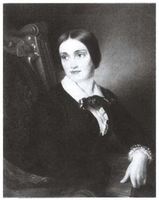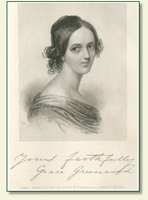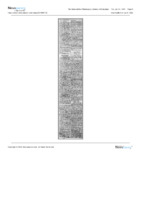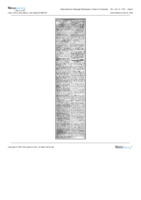"Letters from the Capital," by Grace Greenwood, National Era, 1852
Dublin Core
Title
Subject
Description
Credit
Creator
Source
Publisher
Date
Type
Article Item Type Metadata
Text
[...] The performances of Miss Cushman at the National Theatre, in our city, have been subjects of much interest in the week past. She has been playing a farewell engagement. To you, I know I need say nothing of the merits of this truly great actress. I can tell you little in that regard which you know not already by heart; yet for mine own pleasure, I will induldge myself in a few words. To me, it seems that to all lovers of the histrionic art the acting of Miss Cushman must be not alone a rare pleasure, but for the time an absorbing study. lt takes such a wide, free, fearless sweep, and yet in artistic detail, combination, balance, and symmetry, is so exquisitely true. And then, there is about it that captivating, indescribable, irresistable spirit of abandon, the ever-new, exhaustless enthusiasm of the genuine artist. No true feeling ever loses its truth in her utterance — not great passion is ever drwarfed in her conception. She may exaggerate, but she never belittles — she may over-pass the idea of the poet, but or her own, but she never falls behind it. Her genius is wonderfully strong and individual — full of glowing vitality, palpitating with a rich, vigorous life. Her power in high tragedy has much of regal sway and consciousness — somewhat too much, it may be, of arrogance and fierceness at times; but she grasps you, holds you, and conquers you, finally, whether you rebel, or submit at the first. She compells your half-bewildered admiration, she commands your awe-struck sympathies, she gives you sudden electric shocks of passion, she storms upon you with all the fire and flood of maddened love, hate, revenge, anguish, and despair. But this is only the night side of the picture — there is another side of sunshine, of glad, golden, Italian sunshine. In scenes of playful tenderness, her voice, her look, her manner, have a most subduing sweetness and a peculiar, child-like charm. Yes, child-like; for there is always something of pride and sovereignty about a child, and, in comedy, she ever seems to me to be playing with her wildest wit, sovereignly and proudly, as though half divining that grave fates sometimes come under forms of humorous fancies — as imperial Juno might have trifled with the cuckoo which nestled in her bossom, all unknowing that she fondled and adventurous god, masqerading under borrowed plumes.
There is another picture of her genius, neither of darkness nor fully day, but but of soft and tender moonlight. In scenes ofgreat soul-sounding sorrow, of holy womanly love in adversity, desertion, and death, Miss Cushman's deepest power is no longer stormy, imperious, or exigeant, but seems to steal upon you like the soft step of a beloved friend, who comes to join in your sadness, and grieve with you, rather than ask for your tears. And in the tempest, the deep-breathing times, the after calm, are especially delicious. There are nowhere such pleasant rests to our impassioned interest as in her splendid representation of Romeo. Never shall I forgot the exquisite tenderness, the exquisite tenderness, tho refined passion, the wonderfull blending of manly strength and womanly softness of this noble personation. Before hers, I had never seen any rendering of this character which was not a caricature, or a profanation. But who could to justice to the lightness, the sparkle, the mirthful abandon, the absolute deliciousness of her Rosalind? It is a wonder of art, and yet a delight for its pure, spontaneous naturalness, for its fulness of glorious wit and matchless humor, for its truth to life, womandhood, and Shakespeare. There is about this part and exultant, exuberant joyousness, which must make it a brilliant impossibility, a beautful despair to any but an artiste who has preserved much of the flush and freshness of girlhood, like the joy and fragrance of past Mayday-crownings lingering about her yet. Miss Cushman's triumph in this part proves that the heart of eighteen now trobs in her bossom — that the springs from which her genius first drank have not failed, but gladden, refresh, and sustain it still.
In regarding Miss Cushman, I cannot pay all tribute to the genius and art which have won her such distinction; for the tireless energy, the will, the courage, the indomitable persevance of the woman, claim yet more of my admiration. She has built, block by block, the structure of her own fame and fortunes; she has cut her own way through "the forest of difficulty," has herself bridged all the chasms and floods which lay in her path. And for this I honor her. [...]






